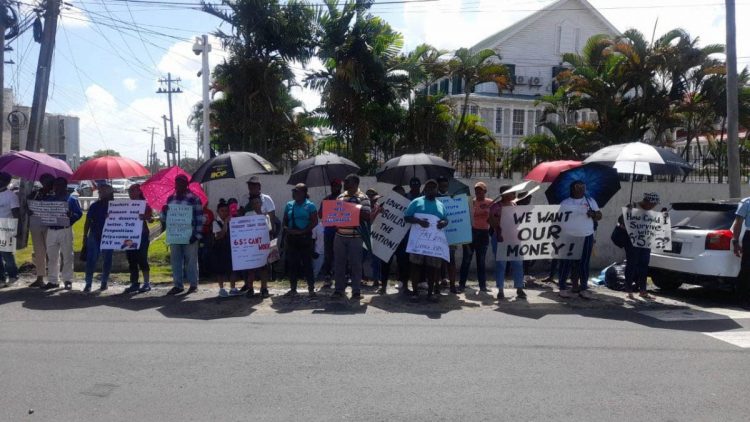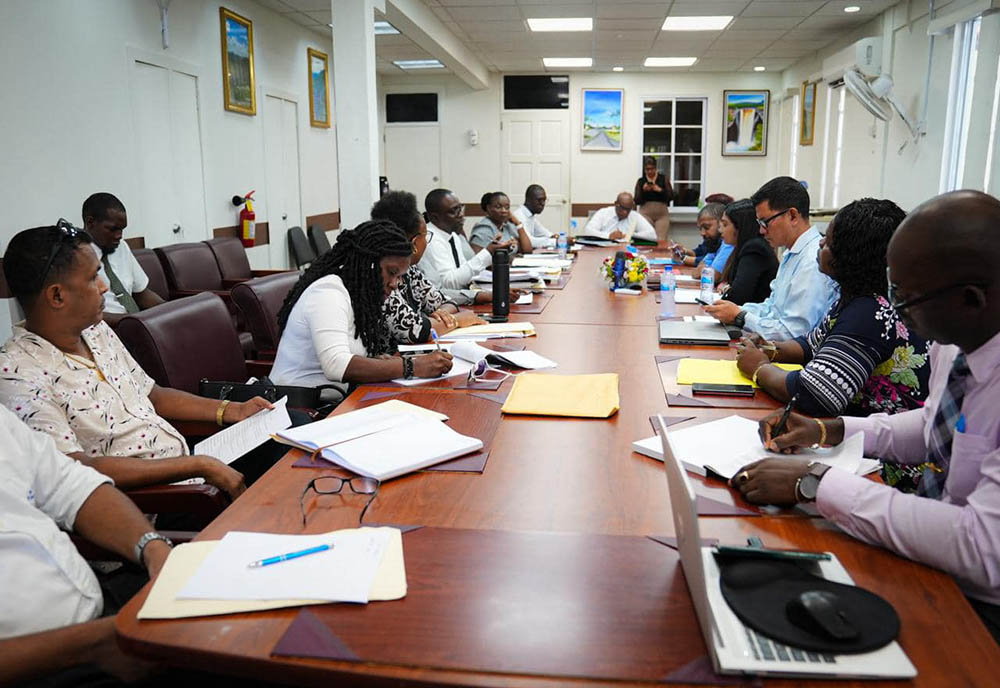The GTU yesterday applied to the High Court for an order of mandamus mandating the government to engage in collective bargaining from 2019 to 2023 and it also wants disclosure of correspondence with the Ministry of Education on the subject.
In the latest twist to a confrontation which saw a four-week-long strike by teachers, the Guyana Teachers’ Union (GTU) is seeking a variety of reliefs. It is unclear when the matter will be heard by the court. A related case is due to be heard again on March 20th.
In addition to the order for collective bargaining, the GTU is seeking an order that Saddam Hussain, Chief Executive Officer, and Shannielle Hoosein-Outar, Permanent Secretary of the Ministry of Education be held in contempt of court for unwillingness and bad faith for refusing to discuss collective bargaining for the period 2019-2023

The union is also praying for an order directing the Ministry of Education to disclose all correspondence, between the GTU and the Ministry of Education, as it relates to the collective bargaining discussions as claimed by the Ministry of Education or in the alternative to disclose whether or not there are any.
It is also seeking a declaration that the GTU has a right to negotiation within the period of 2019-2023.
A declaration that the refusal to negotiate for the period 2019-2023 constitutes a breach of the GTU and its members’ right to collective bargaining under article 147 of the Constitution of Guyana, is also being sought.
The union has also applied for a declaration that the minutes dated 7th March 2024 of a meeting between the two sides, created a binding agreement. Further, it seeking a declaration that the agreement arising from the minutes dated 7 March 2024, created legitimate expectation. Those minutes could be key as they appeared to suggest that the two sides had agreed to talks on 2019 to 2023. Hoosein-Outar replaced Hussain as Chief Negotiator at the meeting last Tuesday and declared there would be no negotiations for 2019 to 2023 and this is what triggered the union’s move to the courts.
The grounds of the application are based on Article 147 of the Consti-tution of Guyana,
Section 10 of the Judicial Review Act and Part 28 of the Civil Procedure Rules
It also cites the mediation ordered by Justice Sandil Kissoon which led to a March 4th Agreement between the Guyana Teachers’ Union and the Attorney General of Guyana (Ministry of Edu-cation) for the following
The Teachers shall, in good faith, resume work on or before Wednesday 6th March 2024
Discussion shall proceed within 48 hours of resumption of work and shall be in relations to matters which either Party considers relevant for discussions between Union and the Government, which include financial matters.
The discussion referred to in clause 2 above shall take place at the Ministry of Education Boardroom, Lot 26 Brickdam, George-town and will continue for a reasonable period of time.
Both parties reserve all their rights pursuant to any agreement under the laws of Guyana.
Following this agreement, Teachers resumed work on Wednesday, 6th March, 2024, as per 1 of the agreement signed between the Guyana Teachers Union and the Attorney General.
On March 7th, 2024, the union application contended that the Ministry of Education and Guyana Teachers Union agreed to table the multi-year proposal 2019-2023 for discussion
The GTU application averred that the agreement reflected on 7 March, 2024 and reflected in said minutes is a binding agreement.
It also contends that the reneging on the agreement, to discuss collective bargaining from 2019-2023, is contemptuous and that the reneging on the agreement, to discuss collective bargaining from 2019-2023, is in breach of article 147 of the Constitution of Guyana
The application also underlined the importance of the ministry producing correspondence to substantiate the ministry’s claim that collective bargaining with the GTU had been pursued. The application was lodged by attorney Darren Wade.
The GTU’s industrial action commenced on February 5th and was initially slated to last for ten days, but actions by the government led to its continuation for over a month. There was substantial support for it all across the country particularly in Region Two, a development which seemed to have surprised the government. Teachers also went on strike across Berbice.
Just before the commencement of the strike, GTU General Secretary Coretta McDonald had expressed frustration with the government’s handling of negotiations.
Before the commencement of the strike, as it began, and throughout its progression, it was deemed political and illegal by members of the government including the Ministry of Education (MoE), the Ministry of Labour (MoL), and Vice President (VP) Bharrat Jagdeo. As time progressed, the union in turn maintained that the strike was lawful as they had exhausted all avenues for wage talks with the government since 2020.
According to the union, a proposal that they submitted in 2020, spanning from 2020 to 2023, did not receive a response from the government. Additionally, attempts to request conciliation and arbitration with the MoL were unsuccessful.
Despite the union’s claims, correspondence from the Chief Labour Officer (CLO) Dhaneshwar Deonarine to the GTU showed him pointing out that the grievance procedure had not been exhausted, as per the agreement between the union and the MoE. Before this correspondence had been sent out, the GTU had written to the CLO seeking arbitration as financial matters were not addressed by the MoE, and an arbitrator mutually agreed upon by both parties was requested to commence the process.
However, no response was received from the CLO regarding the request for arbitration and the union resorted to declaring full-fledged industrial action due to the government’s failure to address their concerns, including wage increases and non-salary benefits, lack of response from the CLO, and unresolved matters impacting the stability of the education system. In its correspondence to the government to inform them of the planned strike action, the GTU had requested an urgent meeting with the MoE to discuss these matters and avoid disruption in the educational system.
After the letter on the planned industrial action was sent out, the CLO finally reached out to the GTU, urging that they refrain from taking industrial action, emphasizing the importance of following the grievance procedure in good faith for industrial relations practice. Deonarine further advised against breaching or violating the Memorandum of Agreement between the GTU and the Ministry.
Deduction
One day after the strike began, the MoE made its first move against teachers by announcing its plan to discontinue the deduction of union dues on behalf of teachers. In a press release issued by the ministry on February 6, the MoE explained that the decision to cease deductions was made per a ruling by Chief Justice Ian Chang in the case of Guyana Public Service Union v Nanda Gopaul.
The release cited the ministry as labeling the industrial action unlawful, racist, and divisive. Further, it said that the majority of the union’s requests were agreed upon by the MoE, and the ministry implemented several initiatives to benefit teachers nationwide.
The ministry then took things a step further, on February 12, vowing to cut the salaries of striking teachers. In response to this, the GTU threatened and made good on its threat to take the government to court over the MoE’s actions.
After the union’s statement of claim against the state was filed on February 14, the government, through Attorney General (AG) Anil Nandlall SC and its other legal representatives, made an application for a 14-day grace period to come up with a response. This was granted and the matter is set to be heard on March 20. Justice Kissoon, who granted the extension, also ruled that the status quo be maintained, thereby stalling the deduction of strike days from teachers’ salaries and maintaining the deduction of union dues, pending the outcome of the matter. It was these orders that eventually led to the Judge asking why there were no talks between the two sides and eventually ordering mediation.
On February 27, the CEO Hussain was summoned before Justice Kissoon after being found in contempt of court for issuing a circular which stated that teachers’ salaries will still be subject to deductions and that the court’s ruling was temporary. Hussain apologised to the judge, who, after accepting the apology, suggested that a mediation meeting be held in court between the two parties.
The GTU readily agreed to the meeting taking place the following day, but Nandlall asked the court for 24 hours to confer with his superiors before making a decision. The following day, despite Nandlall’s disagreement with mediation, Justice Kissoon ordered that the meeting be held under the mediation of Senior Counsel Edward Luckhoo and Robin Stoby.
The mediation meetings commenced on March 2nd and were adjourned in the afternoon and recommenced on March 4th during which time the decision was made for teachers to return to the classroom.
Teachers from the ten regions across Guyana went out in their numbers daily, remaining resilient during the past four weeks, in their campaign for the government to agree to have collective bargaining talks with the union. Whilst students who were getting ready to sit the CSEC, CAPE, and NGSS exams were being deprived of teaching due to the strike, President Irfaan Ali had urged teachers to be patient with the government.
The president had further reminded teachers of his promise for incremental benefits. He also made note of the meeting he’d had with teachers last year to discuss benefits.
Furthermore, during a live broadcast before the mediated end to the strike, Ali called on the striking teachers to return to the classroom, stating that the government will not be bullied into negotiations. The mediation has opened the pathway to such negotiations.
In his statement, the president also pointed out that the government had had more than 25 meetings with the GTU since assuming office. The teachers strike was the most serious faced by this government since it took office in August 2020.






